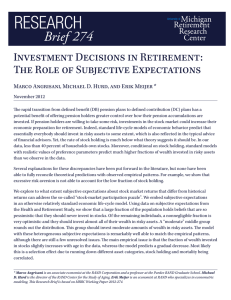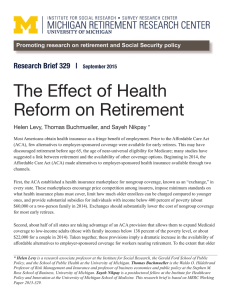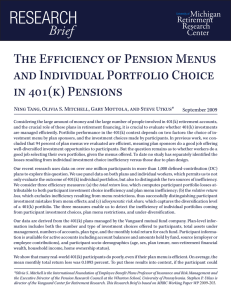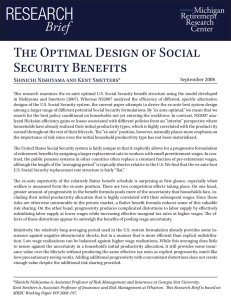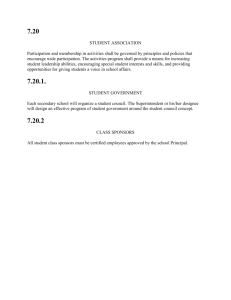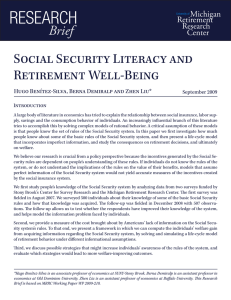RESEARCH in Brief Efficiency of Pension Plan Investment
advertisement
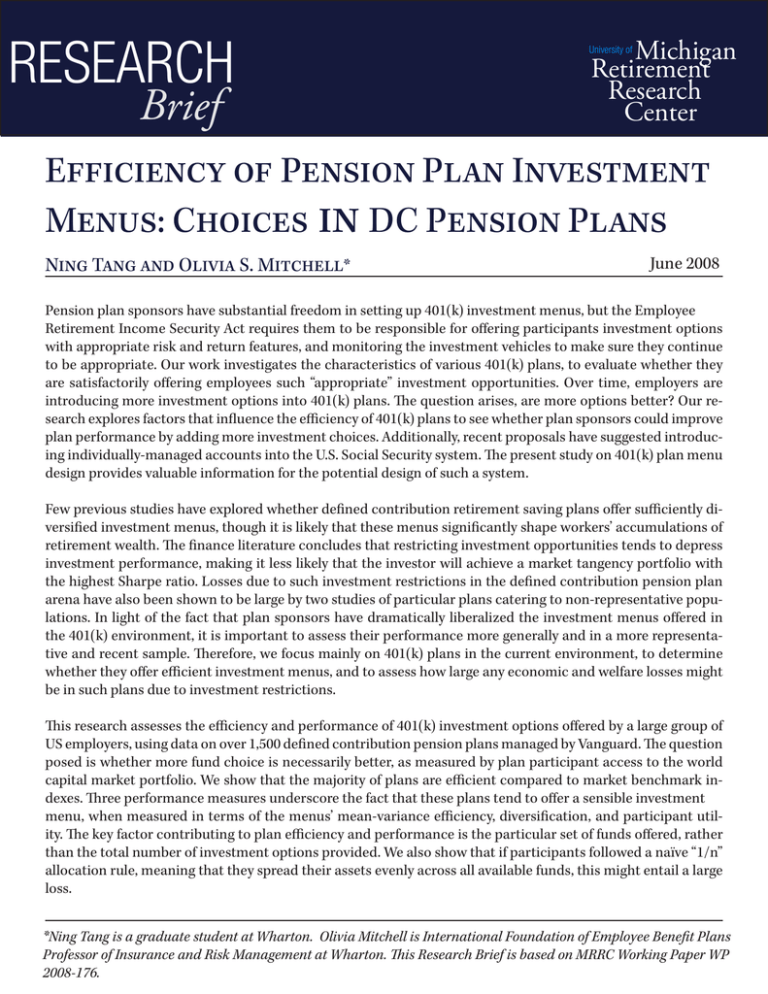
RESEARCH Brief Michigan Retirement Research Center University of Efficiency of Pension Plan Investment Menus: Choices in DC Pension Plans Ning Tang and Olivia S. Mitchell* June 2008 Pension plan sponsors have substantial freedom in setting up 401(k) investment menus, but the Employee Retirement Income Security Act requires them to be responsible for offering participants investment options with appropriate risk and return features, and monitoring the investment vehicles to make sure they continue to be appropriate. Our work investigates the characteristics of various 401(k) plans, to evaluate whether they are satisfactorily offering employees such “appropriate” investment opportunities. Over time, employers are introducing more investment options into 401(k) plans. The question arises, are more options better? Our research explores factors that influence the efficiency of 401(k) plans to see whether plan sponsors could improve plan performance by adding more investment choices. Additionally, recent proposals have suggested introducing individually-managed accounts into the U.S. Social Security system. The present study on 401(k) plan menu design provides valuable information for the potential design of such a system. Few previous studies have explored whether defined contribution retirement saving plans offer sufficiently diversified investment menus, though it is likely that these menus significantly shape workers’ accumulations of retirement wealth. The finance literature concludes that restricting investment opportunities tends to depress investment performance, making it less likely that the investor will achieve a market tangency portfolio with the highest Sharpe ratio. Losses due to such investment restrictions in the defined contribution pension plan arena have also been shown to be large by two studies of particular plans catering to non-representative populations. In light of the fact that plan sponsors have dramatically liberalized the investment menus offered in the 401(k) environment, it is important to assess their performance more generally and in a more representative and recent sample. Therefore, we focus mainly on 401(k) plans in the current environment, to determine whether they offer efficient investment menus, and to assess how large any economic and welfare losses might be in such plans due to investment restrictions. This research assesses the efficiency and performance of 401(k) investment options offered by a large group of US employers, using data on over 1,500 defined contribution pension plans managed by Vanguard. The question posed is whether more fund choice is necessarily better, as measured by plan participant access to the world capital market portfolio. We show that the majority of plans are efficient compared to market benchmark indexes. Three performance measures underscore the fact that these plans tend to offer a sensible investment menu, when measured in terms of the menus’ mean-variance efficiency, diversification, and participant utility. The key factor contributing to plan efficiency and performance is the particular set of funds offered, rather than the total number of investment options provided. We also show that if participants followed a naïve “1/n” allocation rule, meaning that they spread their assets evenly across all available funds, this might entail a large loss. *Ning Tang is a graduate student at Wharton. Olivia Mitchell is International Foundation of Employee Benefit Plans Professor of Insurance and Risk Management at Wharton. This Research Brief is based on MRRC Working Paper WP 2008-176. Our work further shows that including index domestic equity funds in the investment menu improves plan efficiency significantly, while actively managed domestic equity funds appear to reduce plan efficiency, though not at a statistically significant level. We also confirm that plan sponsors that add actively managed domestic equity funds should not do so in the hopes of boosting plan efficiency. Index bond funds improve plan efficiency and index balanced funds reduce it at a statistically significant level. Other funds have no significant effects on plan efficiency. There is no overall support for significant relationships between plan efficiency and attributes of plan or participants, except that 403(b) plans are more efficient than 401(k) plans. After controlling for other factors, we conclude that older participants are more likely to have more favorable investment options, and thus are more likely to have efficient plans. We also find that central to plan efficiency and performance is the particular set of investment funds offered, rather than the number of options. Offering more choice is not necessarily better, when it comes to the 401(k) plan menu. To benefit participants, plan sponsors should focus on selecting or adding funds that improve plan efficiency, instead of simply increasing the number of options, which could hurt plan performance in some cases. Differences between the present study and two earlier studies could be due to the former’s use of more recent data and a larger sample. In light of these findings, plan sponsors should offer menu choices that are both simple and financially efficient and could potentially benefit unsophisticated participants. One option would be life cycle or target maturity date funds which diversify participants’ portfolios across stocks, bonds, and cash and automatically decrease investment risk levels with age. Another would be the combination of target maturity date funds and a safe fund as recommended by some analysts. Future research will examine how effectively plan participants avail themselves of the most efficient investment menus. University of Michigan Retirement Research Center Institute for Social Research 426 Thompson Street Room 3026 Ann Arbor, MI 48104-2321 Phone: (734) 615-0422 Fax: (734) 615-2180 mrrc@isr.umich.edu www.mrrc.isr.umich.edu The research reported herein was performed pursuant to a grant from the U.S. Social Security administration (SSA) through the Michigan Retirement Research Center (MRRC). The findings and conclusions expressed are solely those of the author(s) and do not represent the views of SSA, any agency of the federal government, or the MRRC. Regents of the University of Michigan Julia Darrow, Laurence B. Deitch, Olivia P. Maynard, Rebecca McGowan, Andrea Fischer Newman, Andrew C. Richner, S. Martin Taylor, Katherine E. White, and Mary Sue Coleman, ex officio

